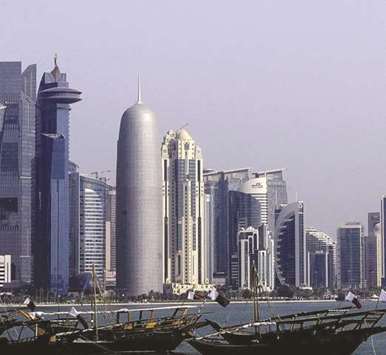Almost all decision-makers interviewed for the first release of the Business Barometer: Qatar Survey carried out by Oxford Business Group (OBG) remain upbeat about the local business environment, despite the ongoing blockade by some of its GCC neighbours.
As part of its survey, the global research and consultancy firm asked over 100 high-level executives from across the country’s industries a series of questions aimed at gauging business sentiment.
In the period after the blockade, 91% of respondents said they felt positive or very positive about local business conditions, up from 74% surveyed in the period June 2016 to January 2017.
In answer to another question, almost 80% of business leaders thought it likely or very likely that their company would make a significant capital investment within the next 12 months, compared to nearer 50% previously. A similar percentage described the level of transparency for conducting business in Qatar relative to the region as high or very high.
Significantly, the share of business leaders satisfied with the quality of local suppliers and service providers was considerably higher than prior to the embargo, rising nearly 15 percentage points, suggesting that Qatar has successfully identified alternative sources and routes for goods previously imported from its neighbours. The country’s lending conditions were also viewed favourably, with almost three-quarters (72%) of respondents saying they found credit easy or very easy to access. On the results in his blog, Oliver Cornock, OBG’s managing editor for the Middle East, said the survey’s results suggested that Qatar had found ways of working around the blockade, with the result that fall-out had been less negative than expected, even in a year of continued consolidation due to lower hydrocarbon incomes.
“There is perhaps an element of defiance in some of the responses, but this can only account for a proportion of the overall upbeat nature of the findings,” he noted.
“Indeed, the speed and ease at which Qatar has managed to find alternative sources for goods previously imported from GCC neighbours have no doubt boosted business sentiment, not to mention resourcefulness.”
Cornock added that while finding a solution to the current political stand-off is in everyone’s interests, the survey results indicate that the local business community feels able to confidently continue with its operations in the interim.
“The increasingly interconnected nature of global markets and the ease with which trade and commerce is done means that new partners and different routes can easily be identified and exploited,” he said.
“It will be interesting to see how sentiment is holding up when we look at the results of the OBG Business Barometer: Qatar CEO Survey this time next year.”
Cornock’s in-depth evaluation of the survey’s results can be found on OBG’s Editors’ Blog, titled ‘Next Frontier’. All four of OBG’s regional managing editors use the platform to share their expert analysis of the latest developments taking place across the sectors of the 30+ high-growth markets covered by the company’s research.

In the period after the blockade, 91% of respondents of the OBG survey said they felt positive or very positive about local business conditions, up from 74% surveyed in the period June 2016 to January 2017.
